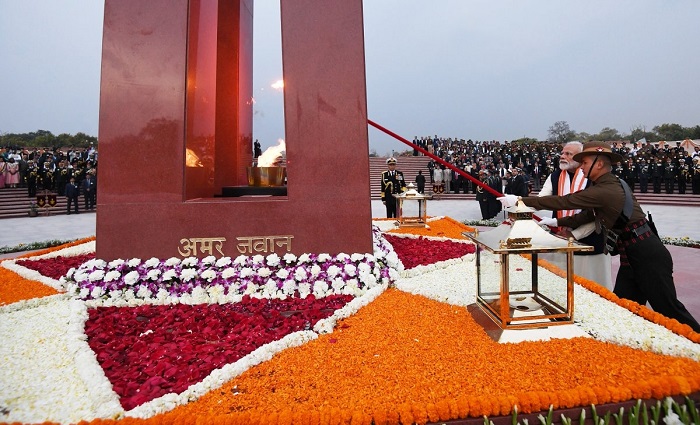
New Delhi, The National War Memorial is likely to replace India Gate and the Amar Jawan Jyoti as the venue for paying respect to the fallen soldiers on national events like Republic Day and Vijay Diwas. The iconic India Gate may see mostly regimental functions of the armed forces.
Much thought has gone into the issue as India Gate, built by the British as a memorial for the 70,000 soldiers of the British Indian army who died in the First World War, has occupied the prime place in honouring the soldier since Independence. An addition to the monument in the form of Amar Jawan Jyoti — a marble pedastal with a cenotaph with a self-loading rifle holding a helmet of an unkown soldier on its barrel — was made after 1971 in the memory of the soldiers who died in the India-Pakistan war leading to the creation of Bangladesh.
The flame at Amar Jawan Jyoti has been burning since 1971.
The National War Memorial commemorates the supreme sacrifice of 25,942 Indian soldiers who laid down their lives post-Independence. It also honours 21 recipients of nation’s highest gallantry award, the Param Vir Chakra.
The National War Memorial has four concentric circles named Amar Chakra (circle of immortality), Veer Chakra (circle of bravery), Tyag Chakra (circle of sacrifice) and Rakshak Chakra (circle of protection).
While inaugurating the Memorial, Prime Minister Narendra Modi slammed the Congress for ignoring armed forces. Attacking the principal opposition party, Modi pointed out various cases of corruption in arms cases during the Congress regime as he made a reference to the Gandhi family saying “for some people it is family first and not India first”.
The construction of National War Memorial and Museum was cleared by the Modi government in 2019. The museum, to be located at the Princess Park adjoining India Gate will take some more years as the construction is yet to commence.









